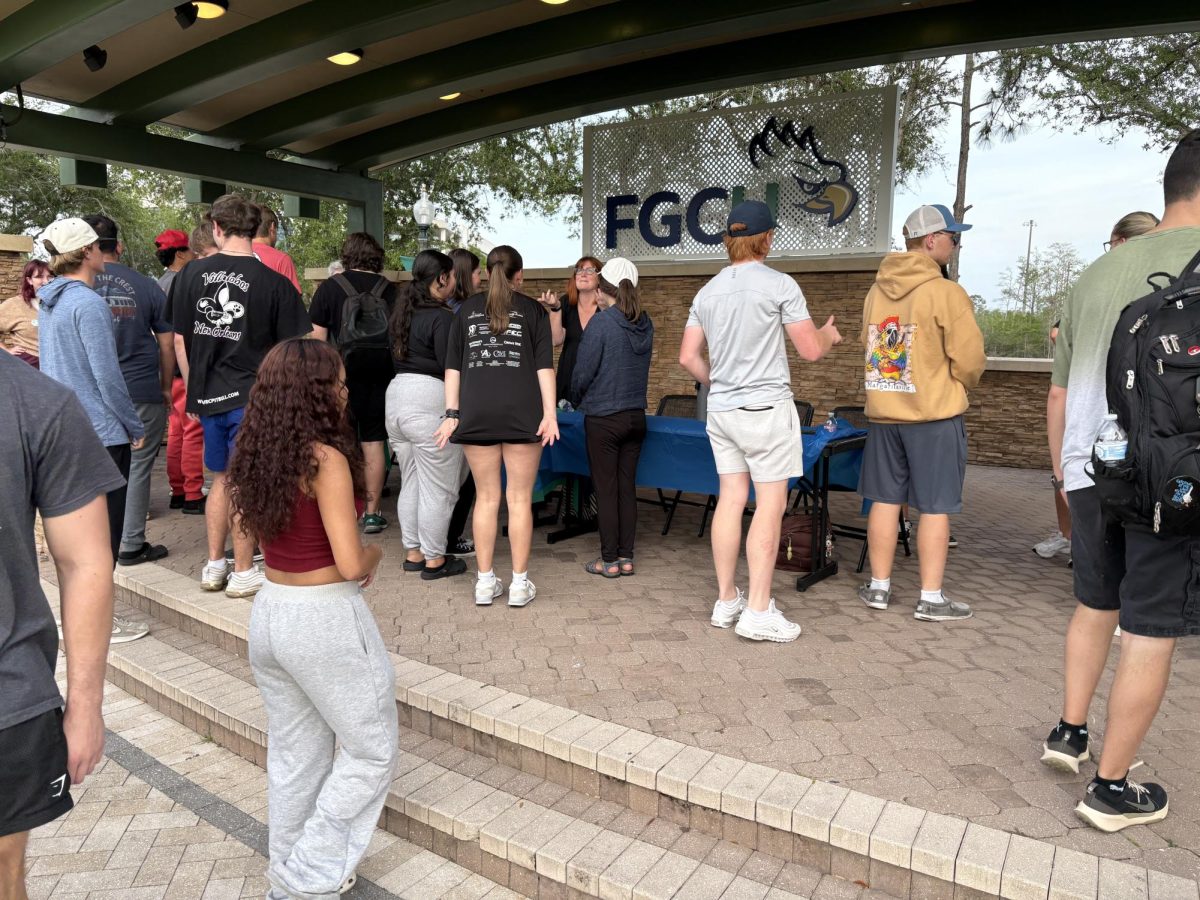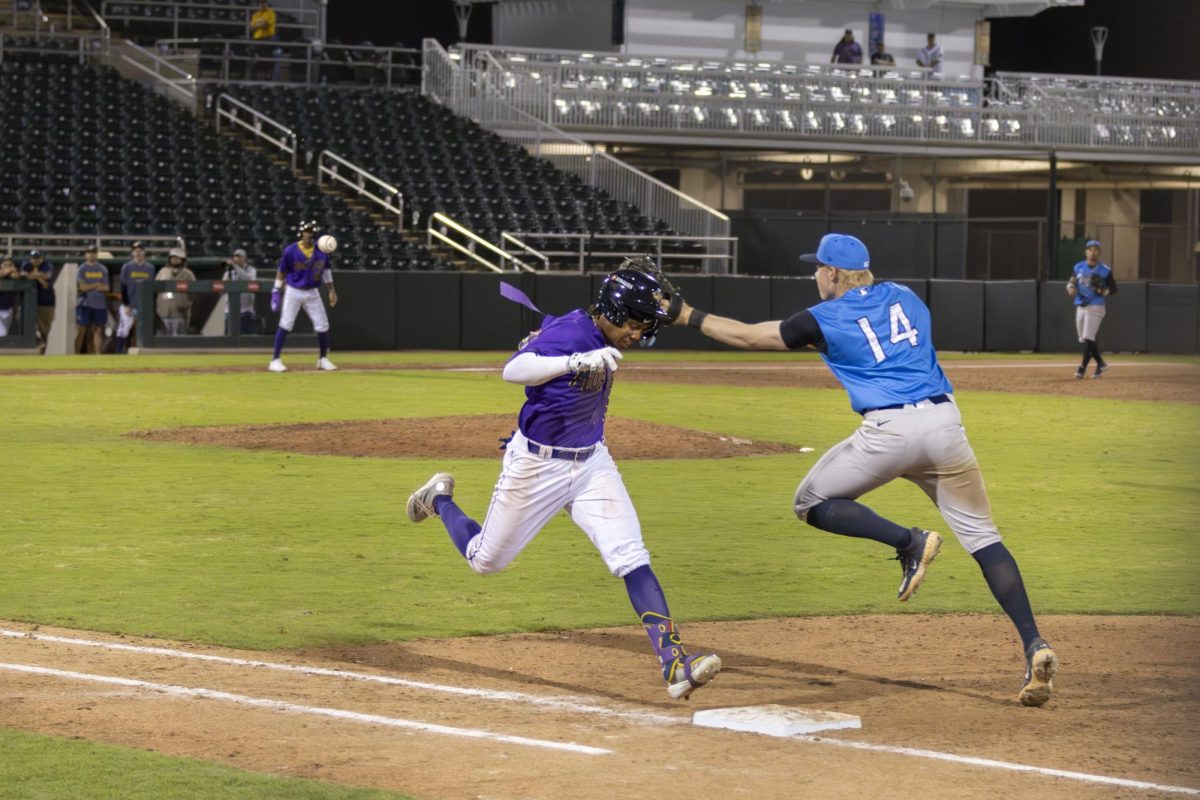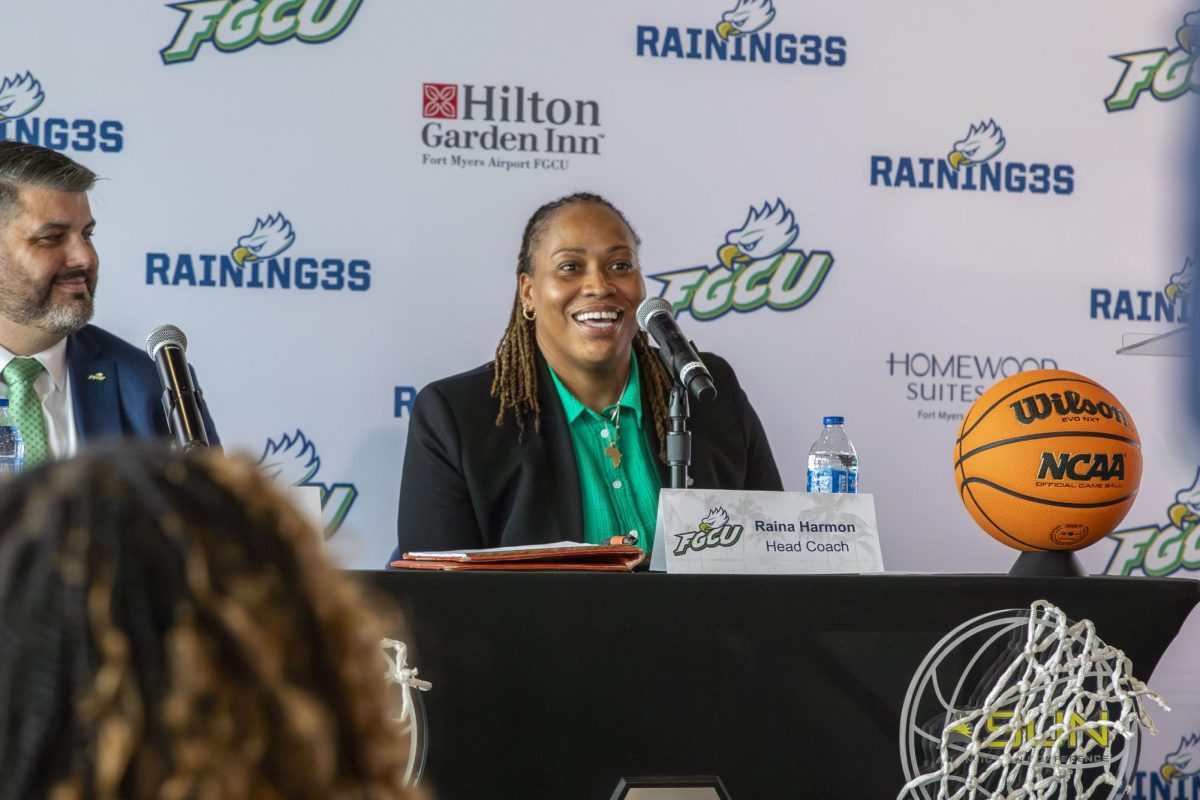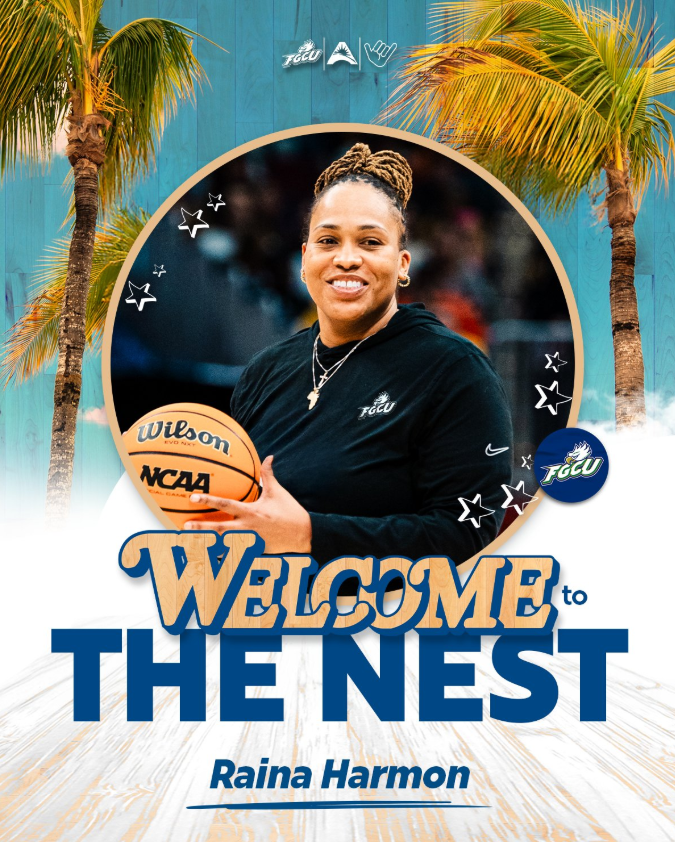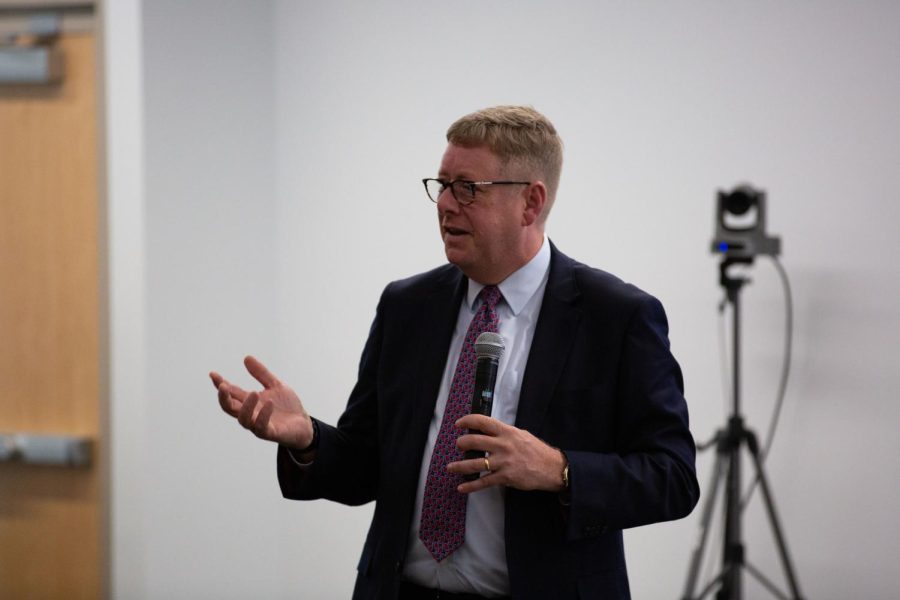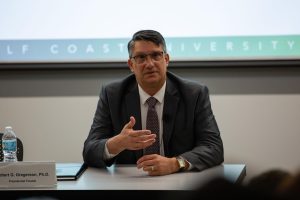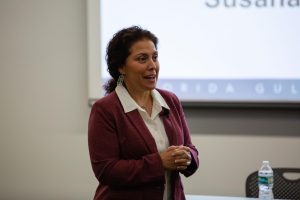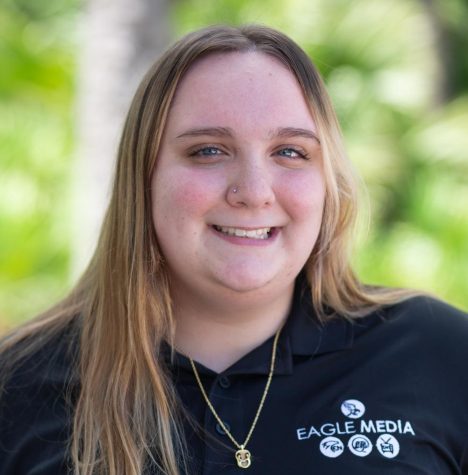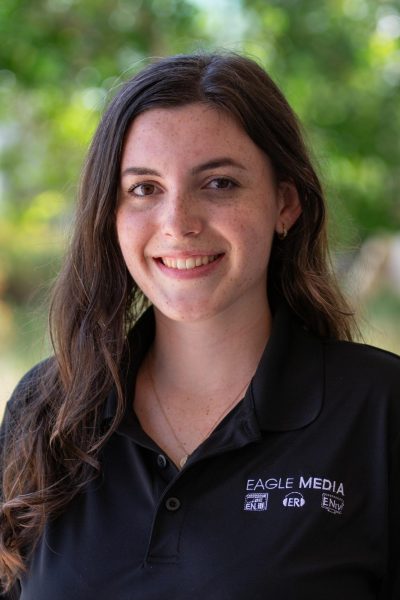Presidential Finalist Tod Laursen Answers Faculty’s Dire Questions
Presidential Search Finalist Tod Laursen answers faculty’s questions at the first presidential forum.
October 30, 2022
Dr. Tod Laursen attended three public forums held in the Water School on Oct. 28 as the decision of FGCU’s fifth president nears. The 4 p.m. to 5 p.m. forum consisted of primarily faculty and staff members asking questions of current FGCU challenges, to see how Laursen would respond as president.
Dr. Lyndsay Rhodes, the faculty senate vice president, moderated the public forum and introduced Laursen. He began by describing his experience in academic leadership in higher education, which is detailed in his resume on FGCU’s website.
“Maybe I’m somewhat delusional, but I do still sort of view myself primarily as a faculty member after all of this time and I think that my experience in that domain, and then increasingly as time went on, being some combination of a faculty member and administrator has served me well,” Laursen said. “But you can kind of see the levels at which I’ve served, and I really feel that I can kind of bring that balanced approach to understanding what a faculty member’s challenges are, what their struggles are, what they need from an institution to be successful, what their students need from them.”
With that statement concluding his introduction, Dr. Carolynne Gischel, FGCU’s chapter president for the United Faculty of Florida, asked the first question of the forum. Gischel explained that the Board of Trustees ratified a new contract that many faculty members weren’t happy with because of the salary increase. She said that in the last three years, faculty has seen a 2.5 percent salary increase; however, the housing costs of Southwest Florida have increased nearly 35 percent.
“What specific actions would you take to ensure, to the best of your ability, that faculty are compensated adequately and that their salaries are increased at a rate that allows them to continue to live in Southwest Florida?” Gischel asked.
Laursen said it would be important to understand on a regional or national basis where FGCU faculty sits in institutions that are comparable.
“What we have seen in New York is we do have some limited autonomy on campus levels that we can make and address issues like this. We don’t usually do it across the board and the reason we don’t do it across the board is we just don’t have enough money to make it meaningful for anyone,” Laursen said. “But we have had to look particularly for some areas of faculty where there’s clear discrepancies between market value and what we’re able to do and try to do something aggressively there to ameliorate that.”
He said that the best people he’s worked with have had more lucrative opportunities elsewhere but choose to stay where they’re at because of the good work environment they’re in, despite the pay difference.
“This is a tough time for everyone, I can only imagine what the last months have been like here,” Laursen said. “So, I would want to make every effort to be empathetic and sympathetic to that there are some things, I think typically in my experience, we’ve been able to do, but it does kind of, unfortunately, sometimes, to be a little bit of a zero-sum game, in terms of how much we’re able to do on that front.”
The next question was submitted in the live broadcast of the forum, asking if Laursen considers himself to be a transformational leader. Laursen answered yes, starting out by saying that the question seemed presumptuous, but that he has a track record of achieving transformation in the jobs he’s been in.
The next question was also submitted to the broadcast, stating that FGCU has a tradition of shared governance; however, over the 25 years they have worked at FGCU, they have seen variations in the relationship between the president, cabinet and faculty. They stated to have witnessed administrators who listen, and administrators pretending to be actively listening to faculty input even though a decision has already been made.
“If you are the successful candidate for president, where would you position yourself on the spectrum? How would you address conflicting input from the BOT and Faculty Senate?” read the question.
Laursen said mutual respect is important among everyone included in this decision. He said he’s seen this done before in previous employments. He said that there are members of the campus who are qualified to make more informed decisions than others.
“There are times where I think somebody in my position will have to say, ‘I’ve heard you, this is the decision I’m making. I know you’re not going to be 1,000 percent happy with this, but at least there was a meaningful, respectful exchange of opinions and ideas that led into making that decision.’ I know that there are times when that has to happen, but I think that process is very important,” Laursen said.
Dr. Jennifer Sughrue, the coordinator of FGCU College of Education doctoral program, asked the next question.
“We’re on the cusp of becoming a Hispanic serving institution and I would like to know from you, what are some initiatives that you have directly taken an interest in and implemented in making a campus more inclusive, more welcoming, and finding underserved populations helping underserved populations be successful?” Sughrue asked.
Laursen explained that in the New York higher education system, there’s a significant gap between the diversity of the students and of the faculty that serve them. To combat this, a data-driven program called PRODiG was introduced to encourage diversity across the system. This program focused on the systems hiring practices to make sure that the hiring pools were as diverse as the community. He said around 100 hires have been made with this program.
“A lot of what we’ve done actually on my campus now has been together with our chief diversity officer, has been to put together a task force that’s largely student-led that has to do with: what are the things we want to prioritize and the campus culture sense to really make this a welcoming place for people of all persuasions to come and study and work and that’s been kind of amazingly revelatory,” Laursen said.
Bill Reynolds, the director of the Lucas Center for Faculty Development, spoke next. He referred to a meeting where President Martin said that he would want the incoming president to know that roughly 70 percent of his time is spent off campus to cultivate external stakeholders.
“I guess my question is, how does that square with your past experience as a university administrator, how does it square with your talents that you bring to this position? And you know, maybe the question ends up being what kind of politician are you?” Reynolds asked.
Laursen agreed that there were months at a time when he experienced 70 percent of his time as an administrator off campus. As the previous president of Khalifa University in Abu Dhabi, he would have to explain to stakeholders what the university aspired to be. He said he is comfortable with the idea of multitasking, as a modern president needs to.
“There are things happening on campus that, as a leader, you have to be cognizant enough, you have to know what’s on the students’ minds, you have to know how they’re feeling about whatever challenges we may be collectively facing,” Laursen said. “We’ve just been through COVID, you all have just been through a hurricane right after that, times like that are times where if you don’t have those relationships on campus, as a leader, it’s going to be very difficult for you perhaps to provide the support that people need, and to do it in a timely way.”
An emailed question was announced, asking what his approach is to better campus life for students.
Laursen explained that at the Utica campus, he was part of a decision that changed food vendors in order to provide better food to students. He said that although it was more expensive, it was the right decision to make.
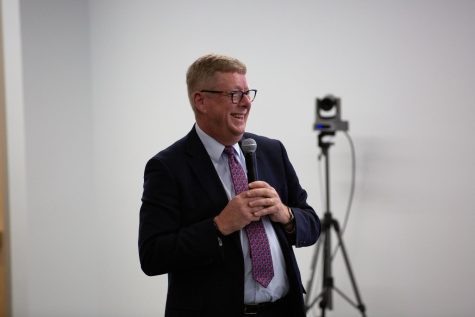
The next online question was, how he would address faculty with courses that have high DFW grades. DFW grades refer to the percentage of students in courses receiving a D, F, or withdrawal.
Laursen said that as a faculty member, he mostly taught sophomore-level courses, which are primarily introductory courses, so it was understandable why students received these grades. He explained that in Abu Dhabi, students were previously taught in Arabic so they could not perform the same as English-speaking students in that setting. He encouraged an extra semester to bridge these gaps.
Dr. Jaffar Ali Shahul Hameed, a mathematics professor, spoke next.
“Given recent changes in the Florida Legislature, regarding HB 7, what are your thoughts on academic freedom? And what is your commitment to academic freedom?”
Laursen expressed that if you want to be successful and influential, you have to have difficult conversations respectfully. He said that universities should be a safe place for these conversations
“I think we have to be very careful about making decisions that would prohibit, for example, a faculty member from being able to present elements of whatever discipline they are, that are core to understanding that discipline…,” Laursen said. “But I would also argue that it’s better for a student leaving here to at least be aware of those disagreements than to just not ever heard the conversation at all,” Laursen said.
Joseph Fogg, a member of the Board of Trustees, asked how Laursen went from being a provost of SUNY, in charge of half a million students, to an acting president, in charge of fewer than 5,000 students.
Laursen said SUNY Poly had temporary leaders and that his leadership background in Abu Dhabi made him a candidate for the position, and the chancellor asked him to step into the position.
“The selfish part is that you’re right, huge job, I actually liked it. I learned a lot. I’m probably crazy for liking it…” Laursen said. “But I really missed being on the campus.”
Another online question was announced, asking Laursen about his experience working with and supporting humanities programs and faculty.
He said he taught engineering in a liberal arts institution and collaborated with faculty in humanities, sciences and social sciences. He said that personally, his sons both are involved in classical music, and he saw what went into an arts education from a mentor’s standpoint.
Brenda Thomas, the director of university colloquium, spoke and said there are conversations happening “to water down” the colloquium and civic engagement components of FGCU.
“The president has a significant hand in directing those changes,” Thomas said. “So, how do you balance growth, with maintaining distinctiveness, recognizing that a lot of that comes down to money, which is scarce? The pot is only so big. So how do you do that? How do you maintain distinctiveness and growth at the same time?”
Laursen said colloquium and civic engagement were the first things he noticed when reading the prospectus of FGCU.
“There’s no perfect answer, the bigger question you’re asking is this trade-off and I personally think that if you start making compromises away from the things that make you distinctive, you really have to question whether that’s what you want to be doing, and things that are worthwhile, don’t come for free,” Laursen said.
Kara Winton, a public relations instructor and communication chair for faculty, asked what administration can do beyond salaries to foster a better relationship with faculty to create a more positive work environment.
From his experience, Laursen recommended having a good relationship with the research office to know how to get grants funded, how to find collaborators in the university, or how to join one of the research centers.
“We have the ability also as an institution, that if we say something’s important, whether it’s research activity, having cutting edge pedagogy in our classes, doing more online, for example, do we have the resources that we can provide faculty that don’t? Inhibit their ability to fairly easily create online content. These oftentimes require resources and investment on the part of university and so we’re kind of having a fresh look at our place, about what some of those support mechanisms need to be for our faculty. That’s at least the kind of thing I had in my mind,” Laursen said.
Dr. Sandra Pavelka, professor of political science and public administration, asked what essential elements in the university community are to successfully work together in shared governance and collective bargaining.
“I think as long as we all mutually remember, and I think most of the time, we do a pretty good job of this, if we mutually remember that our priority is our students, and providing them with the best experience at our university that we can and we’re thinking at all times to the best we can, we have different things to advocate for, but we’re thinking about the betterment of the institution. Things have a way of working out,” Laursen said.
The public forum ended with that question.


